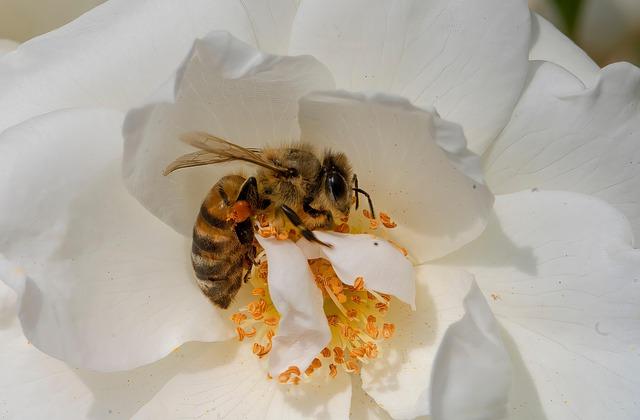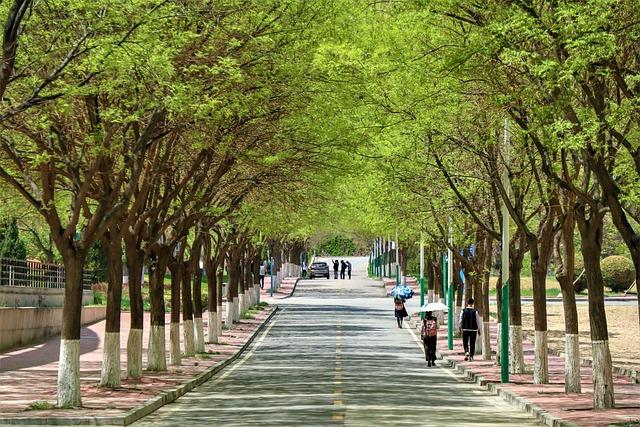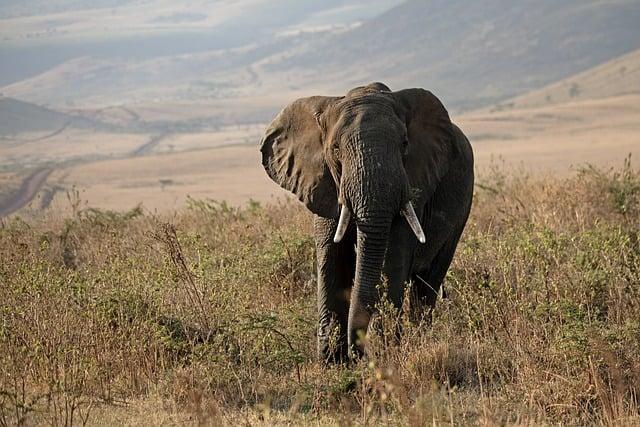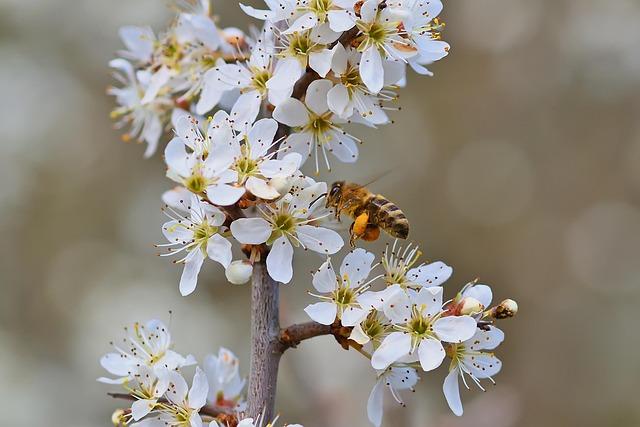Purdue University has achieved the distinguished designation of a Bee Campus USA affiliate, marking a significant step forward in its commitment to pollinator conservation. This recognition not only underscores the university’s dedication to environmental sustainability but also highlights its proactive efforts in educating the community about the importance of pollinator habitats. As an affiliate, Purdue joins a growing network of institutions focused on creating environments conducive to the health adn longevity of bees and other pollinators, which play a crucial role in our ecosystems and agriculture.Wiht this accolade, Purdue aims to implement various initiatives that promote biodiversity and foster awareness about the challenges pollinators face, ultimately contributing to a more sustainable future.
Purdue University Celebrates Bee Campus USA Designation for Enhanced Pollinator Support
Purdue University has officially joined the ranks of institutions recognized as a Bee Campus USA affiliate, a designation that underscores its dedication to supporting pollinator populations and creating sustainable habitats on campus. This initiative aims to foster a greater awareness of the vital roles bees and other pollinators play in our ecosystems and agricultural systems. The university plans to implement a range of educational programs and conservation practices designed to promote pollinator health and biodiversity.
The benefits of this designation extend beyond just bees; it encourages a collaborative effort between students,faculty,and the community. Some key initiatives Purdue plans to pursue include:
establishing Pollinator Gardens: Transforming areas of the campus into vibrant natural habitats for bees, butterflies, and other pollinators.
Educational Workshops: Organizing events to educate the community about the importance of pollinators and how to support them.
Research Opportunities: Engaging students in research projects focused on pollinator ecology and conservation strategies.
To further illustrate the impact of this initiative, a recent study highlights the decline in pollinator populations and its implications:
Year
Pollinator Decline (%)
impacted Crops
2006
30%
Apples, Berries, Almonds
2015
50%
Cucumbers, Melons, Peppers
2020
70%
Tomatoes, squash, Canola

Understanding the Importance of Pollinator Conservation in Educational Institutions
Pollinator conservation is increasingly gaining recognition as a vital component of environmental education in academic settings. By embracing initiatives like the Bee Campus USA designation, educational institutions not only enhance biodiversity but also foster a deeper understanding of ecological interdependence. This designation encourages campuses to implement sustainable landscaping practices, create pollinator-pleasant habitats, and engage students in hands-on learning experiences that emphasize the crucial role of pollinators in ecosystems. The integration of such programs into the curriculum sparks awareness and advocacy among students and the broader community, showcasing the role of education in environmental stewardship.
The efforts to promote pollinator conservation in schools and universities bring numerous benefits that extend beyond the institution itself. By cultivating pollinator gardens and establishing research projects, institutions can:
Enhance campus aesthetics: Creating vibrant and diverse green spaces attracts not only pollinators but also enhances the beauty of the campus.
Support local ecology: Engaging in conservation efforts helps maintain local biodiversity, ensuring the survival of various plant and animal species.
Encourage community involvement: Involving students and faculty in conservation projects fosters a sense of community and shared purpose.
Facilitate research opportunities: Students and faculty can collaborate on research initiatives that contribute valuable data to the field of ecological conservation.
Moreover, thorough programs aimed at pollinator protection can serve as a model for other community organizations, amplifying the message of the importance of pollinators on a larger scale.As institutions like Purdue take on leadership roles in these efforts, they not only contribute to the well-being of local ecosystems but also champion a movement that aligns education with sustainability and conservation goals, creating a legacy for future generations.

Strategies for Engaging Students and Faculty in Pollinator-Friendly Initiatives
To foster a culture of sustainability and environmental awareness on campus, it is essential to involve students and faculty in hands-on initiatives that promote pollinator conservation. Engaging the university community can be achieved through various methods, including:
Workshops and Seminars: Organizing educational sessions focused on the importance of pollinators in ecosystems and agriculture.
Gardening Clubs: Encouraging the formation of gardening groups to create pollinator-friendly gardens on campus.
Campus Events: Hosting pollinator-themed events, such as “Bee Days,” which include activities like planting flowers, building bee hotels, and informative booths.
Collaborative Projects: Partnering with local environmental organizations for joint initiatives aimed at boosting biodiversity.
Incorporating incentives can further enhance participation among students and faculty.Recognizing contributions through various platforms can bolster commitment, such as:
Recognition Programs: Acknowledging outstanding student and faculty efforts in conservation efforts with awards or special mentions.
Research Opportunities: Offering grants or research credits for students involved in pollinator conservation research projects.
Community Service Hours: Providing volunteer credits for participation in pollinator initiatives, making it easier for students to get involved.
Social Media Campaigns: Using social media to highlight individual contributions,share results,and raise awareness about pollinator issues.

Future Plans and Collaborative Efforts to Sustain Purdues Pollinator Conservation Goals
Purdue University is committed to reinforcing its role as a steward of pollinator health through several future initiatives designed to enhance its conservation goals. In collaboration with a range of stakeholders—including local communities, government agencies, and environmental groups—Purdue plans to implement a series of programs aimed at integrating pollinator-friendly practices into campus operations and educational curricula. Key components of these initiatives include:
Enhancing native plant gardens: Expanding existing gardens and establishing new habitats to attract and support diverse pollinator species.
Educational workshops and seminars: Hosting events that educate the public and students about the importance of pollinators and sustainable practices.
Research collaborations: Partnering with fellow institutions and organizations to advance scientific research on pollinator health and conservation.
The university also aims to leverage its affiliation with Bee Campus USA to cultivate a culture of sustainability and environmental awareness across the student body and faculty. Purdue plans to measure the success of its conservation efforts through a defined set of metrics and community engagement strategies. This will include:
Metric
Target
Pollinator species diversity
Increase by 25% over five years
Community participation
Engage 1,000 community members annually
Educational outreach
Conduct 20 workshops per year
Through these collaborative and innovative efforts, Purdue University seeks not only to bolster its biodiversity but also to inspire a lasting commitment to pollinator conservation that extends beyond the campus, impacting the wider community for generations to come.

In Summary
Purdue University’s designation as a Bee Campus USA affiliate marks a significant step forward in the realm of pollinator conservation. this recognition not only highlights the institution’s commitment to fostering biodiversity and sustainability but also sets a precedent for educational institutions nationwide. By implementing initiatives aimed at creating bee-friendly habitats and raising awareness about the crucial role that pollinators play in our ecosystem, Purdue is paving the way for a collaborative effort to protect these vital species. As the university embarks on this journey, it serves as an inspiring model for other campuses, encouraging a collective movement toward environmental stewardship and the preservation of our planet’s natural resources. As we continue to face challenges related to habitat loss and declining pollinator populations, Purdue’s proactive measures signal hope and progress in the fight for ecological balance and biodiversity conservation.
Author : Atticus Reed
Publish date : 2025-03-27 02:45:00
Copyright for syndicated content belongs to the linked Source.